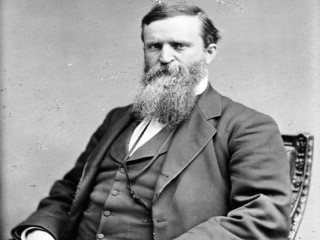
James B. Weaver biography
Date of birth : 1833-06-12
Date of death : 1912-02-06
Birthplace : Dayton, Ohio, U.S.
Nationality : American
Category : Politics
Last modified : 2011-07-12
Credited as : Politician, U.S. House of Representatives, Civil War
James Baird Weaver was born on June 12, 1833, at Dayton, Ohio. His family soon moved to the virgin prairies of lowa to farm. Weaver attended country schools. When gold was discovered in California, he longed to go west. In 1853 he accompanied a relative to the gold fields but soon returned disillusioned. He entered and graduated from Cincinnati Law School in a single year; then he opened law practice in Bloomfield, lowa, in 1856.
Weaver immediately became absorbed in local politics as a Republican opposed to the expansion of slavery into the territories. When the Civil War came, he volunteered as an officer and participated in the bloody battles at Ft. Donelson and Shiloh. At Corinth he assumed field command when his superior officers were mortally wounded, and he received a promotion to major. He returned to lowa in 1864 and at war's end was breveted brigadier general. He was known subsequently as "General" Weaver.
As a staunch Republican and a Civil War veteran, Weaver was destined for a political career. He was successful in obtaining a place as district attorney in 1866. Between 1867 and 1873, while holding the appointive position of assessor of revenue for the Federal government, he found himself at odds with the Republican leadership over currency policies and the subsidization of corporate endeavor, chiefly railroads, that he thought were exploitive. His militant moralism, ardent prohibitionism, and evangelical Protestantism compounded his difficulties. His political enemies blocked his nomination for Congress in 1874 and for governor in 1875.
Weaver wanted the currency expanded to meet the needs of the economy; his party wanted to appreciate the value of the dollar to aid the creditor. Conservatives unfairly branded him as an advocate of unlimited inflation and debt repudiation. Finally, Weaver joined the Greenback party, which favored his views on monetary reform. He was elected to Congress in 1878, ran for president in 1880, lost the congressional election in 1882, but won two additional terms after 1884 as a candidate for this minor party.
Weaver joined the Farmers' Alliance, which also championed his views on money matters, and played a major role in bringing that organization into the Populist party, which succeeded the Greenback party as a vehicle for reform. As the party's candidate for president in 1892, he received over a million popular votes and 22 votes in the Electoral College. Four years later he led the fusionist group within the Populist party that brought about a merger with the Democrats behind William Jennings Bryan's unsuccessful presidential campaign. This terminated the Populist crusade, and Weaver's career as a national politician was over. He returned to lowa, on occasion serving as mayor of his hometown, Colfax. He died in Des Moines on Feb. 6, 1912.
















